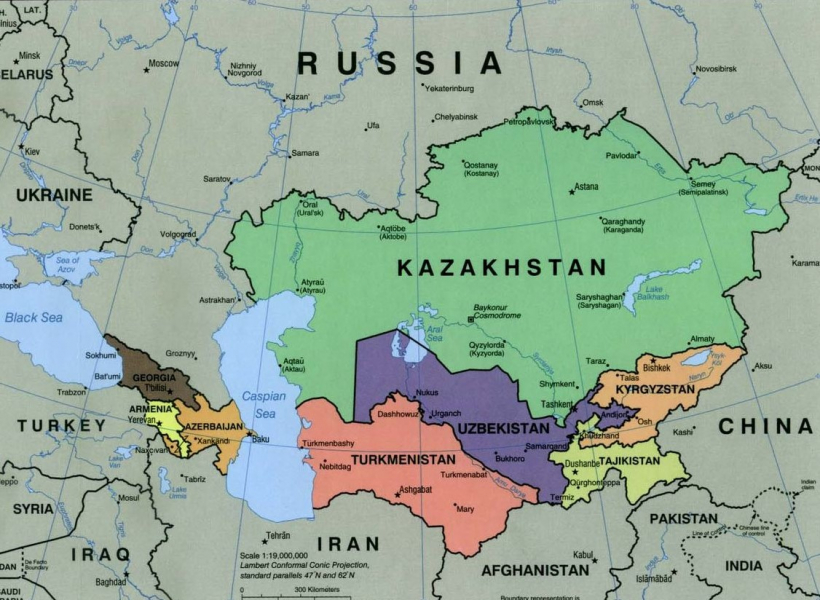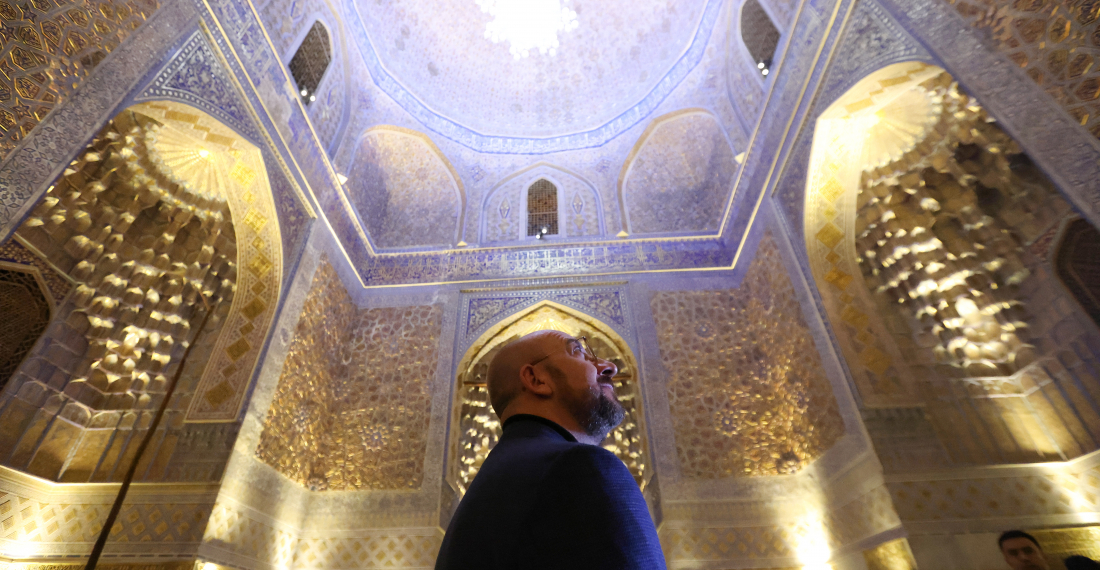Very often, Central Asia is referred to as Russia’s back yard, even though today the region feels more like China’s front garden. But whilst the two “inseparable” friends, compete for influence and resources, the five Central Asian countries have set on a course to integrate themselves in global processes, break out of their geographic - and more importantly their geo-political constraints - and deliver better for their people. In doing so they have been reaching out to the EU and the US, whilst domestically some of them have embarked on deep reforms considered all but unimaginable until recently. The visit of European Council president Charles Michel to the region on 27-28 October marked a high point in a new phase in the relationship between the EU and Central Asia. In Kazakhstan, Michel not only met the Kazakh leadership, but also held a summit with the five Central Asian leaders in Astana, before travelling to Uzbekistan. For both the Central Asians and for the EU this is a watershed moment, and the beginning of a long journey.
The five Central Asian states: Kazakhstan, Kyrgyzstan, Tajikistan, Turkmenistan and Uzbekistan were, until 1991, union republics within the Soviet Union, and for a long time before that part of the Russian empire. Stretching from the shores of the Caspian Sea to the borders of India and China, the five countries have a combined area roughly as large as the combined area of all 27 EU member states, but with a much smaller population: there are 72 million citizens of the 5 Central Asian states compared with 447 million EU citizens.

Russian hegemony
Russia expanded into Central Asia in the 19th century. It was part of a the process of the Tsarist empire’s global ambition. Until then Central Asia was perceived as a buffer between Russia to the north and the British Empire’s Asian possessions, including the jewel in the crown - India, to the south. The competition for control and influence at this time is popularly described as “the great game”, an unfortunate term which some insist on repeating to describe more contemporary processes.
Whilst 19th century Russia was a foreign occupier, it was in some sense also a liberator. The time of the glory of the great Khans had long gone, and what was left were despots who ruled with brutality and greed over impoverished populations. When the Soviets took over Russia after the October Revolution they also inherited the Tsarist empire, which they sought to turn into a new socialist paradise. The effects on Central Asia were electrifying. As my friend, the late Paul Bergne – distinguished British diplomat and academic who served as the first British Ambassador to Uzbekistan – used to say, if you were a subject of the Emir of Bokhara, communism would have felt refreshingly liberating. The Soviets and the Central Asians found a common language. The Soviets ruled Central Asia with a broad brush, shamelessly exploiting its natural resources, ensuring its territory was denied to anyone else, but generally leaving the local leaders to their own, often very corrupt, devices. When the Soviet Union collapsed in 1991, and the five “stans” all of a sudden found themselves independent states, they were even less ready for independence than the other post-Soviet states. This was a situation that Russia exploited, as it tried to maintain a hegemony over the region. Not that this was unchallenged.
The first to challenge the Russian dominance was Turkey, which has close ethnic, linguistic and religious affinities to the region. Similarly Iran in Tajikistan. Europe and the US also tried to engage with the region. But the success of these outside players was limited. The Russians maintained a firm hand on the security forces, and on the natural resources. The Turks for a while were relegated to the role of building contractors. The US had some limited military presence during the time of the invasion of Afghanistan, to which the Russians had acquiesced for a short period. But Russia maintained its privileged position. That has now started to change.
China
The country that challenged Russian dominance in the region more systematically and successfully, and continues to do so, was China. Like Russia, China sees in Central Asia, with its vast landmass and resources, a land of opportunity, a stepping stone to the world markets through overland routes, and in the final analysis a buffer against malign forces. Chinese investment and labour poured in; trade flourished, and with it Chinese political influence. It was no coincidence that the first overseas trip of China’s President Xi, after the COVID-19 lockdown, was to Central Asia. The Russians are concerned about this Chinese presence, but could not do much about it, and for the moment at least, China is not perceived as an immediate threat. But behind the scenes there have been tensions as the two tried to elbow each other out of sensitive or lucrative areas. The Central Asians were first amused, but soon concerned.
Addressing the disappointments of the last three decades
Overall in the region, but particularly in the two largest and most powerful countries, Kazakhstan and Uzbekistan, there is disappointment that the last thirty years have failed to produce the kind of progress and development that the citizens of the these countries now expect. This, it is now recognised, was partly the result of over dependence on Russia and China, partly because the leaderships of the respective countries prioritised stability over progress with the result that they ended up with stagnation.
Kazakhstan is the largest central Asian republic and the richest, due to its energy resources. President Kassym-Jomart Tokayev, in power since 2019, has stepped up the process of reform, despite a backlash from supporters of former president Nazarbayev. In a few days he faces the people in presidential elections under a new constitution, which allows the winner to govern for only one seven-year term. Tokayev is running on a programme of root and branch reforms that are simply too substantial to be described as window-dressing.
Neighbouring Uzbekistan was for long perceived as central Asia’s giant because of the size of its population, around 28 million. Under the iron fisted rule of president Islam Karimov Uzbekistan had become a pariah state due to the level of human rights abuses in the country. On assuming power in 2016, president Shavkat Mirziyoyev has been actively working to change things and to take Uzbekistan out of its international isolation, actively seeking foreign investment, and slowly opening up the country.
Neither Tokayev nor Mirziyoyev are democrats in the sense understood in the west, yet the process of reform that they have initiated is genuine enough, and the positive impact on good governance and human rights can be felt, even if for many it is still not enough. It is one reason why they have been embraced by both the US and the EU who see in both of them good partners.
The EU vision for the region
The visit of President Michel to the region on 27-28 October was timely and significant.
For some time now the EU has been trying to articulate a vision for its future relations with the region. A new Central Asia Strategy was published in 2019, putting development and connectivity at the heart of the relationship. An EU Special Representative for Central Asia helps to keep relations with the five countries in a regional context. Michel’s meeting with the five leaders (even if Turkmenistan was represented by an envoy of the president, and not the president himself), was an expression of this regional approach. In the end however the EU will need also to work with those that are keenest to work with it.
The European Union says that it “has significant stakes in Central Asia, given the strategic geographical location and the pivotal role of the region in Europe-Asia connectivity, its vast energy resources, significant market potential and its role in broader regional security, in particular in the light of developments in Afghanistan.”
“The 2019 EU Strategy aims to help Central Asia develop as a more resilient, prosperous and interconnected space”, according to the EU, which can be translated to undiplomatic speak as meaning that the EU is ready to help the Central Asians break the Russian-Chinese stranglehold on them, and help them connect better with the rest of the world.
Europe needs to be respectful but not meek
Europe’s approach to Central Asia needs to be respectful, both to the five countries themselves, and to their existing partners. Arrogance, even of the intellectual kind will simply backfire. But respect does not mean meekness. As a heavyweight in international relations, even if for the moment its economic weight dwarfs its political weight, the EU needs to approach Central Asia neither as a supplicant, nor as a benefactor, but simply as a reliable partner. Furthermore, this partnership needs to be diverse, multi-tiered and nuanced. It must take in relations with citizens, where Europe has much to offer both in terms of being a model, but also in terms of what it can share in areas such as education, innovation, youth welfare, women’s rights and diversity.
Central Asia is important, and its importance is now increasingly recognised. The five Central Asian states are actively seeking to diversify their political and economic relations with the outside world. Europe needs to embrace this neighbouring region and find ways in which it can be a good friend and partner to its people.






